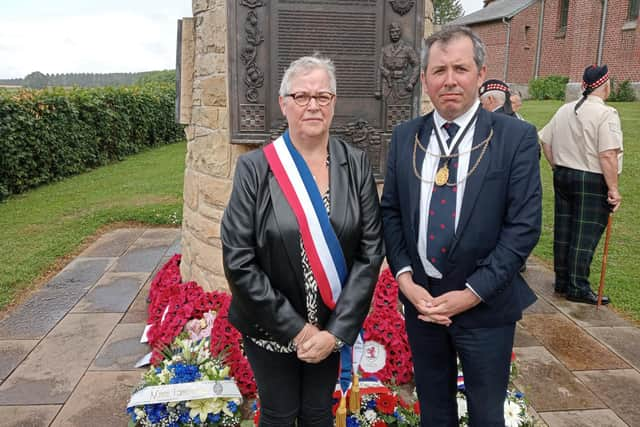Edinburgh McCrae's Battalion: City reaffirms friendship agreement with French village of Contalmaison
and live on Freeview channel 276
Edinburgh has reaffirmed the city’s Friendship Agreement with the northern French village of Contalmaison, the final resting place of many soldiers from the Capital who fought in the famous McCrae’s Battalion during the First World War.
In 2020, the city council voted unanimously that the then Lord Provost Frank Ross should sign a joint agreement in July that year with the Mayor of Contalmaison, recognising “the long-standing ties between both communities and the shared history they possess”. Last weekend, Baillie Jason Rust took part in a reaffirmation of the friendship agreement signing at a ceremony organised by McCrae’s Battalion Trust in Contalmaison.
Advertisement
Hide AdAdvertisement
Hide AdAlthough the agreement does not hold any formal legal status, the council says it is an important symbol of the continuing strong relationship between the city and village established at the First World War’s Battle of the Somme. On July 1, 1916, the 16th Battalion of the Royal Scots, affectionately referred to as McCrae’s Battalion, helped to lead an offensive charge from British lines onto Contalmaison.


The McCrae’s Battalion was a volunteer battalion of the 16th Royal Scots formed by Lieutenant-Colonel Sir George McCrae who rallied the men of Edinburgh to enlist beside him. It was also referred to as “The Sporting Battalion” because of the high number of professional sportsmen drawn from Heart of Midlothian FC, Hibernian FC and a number of other sporting clubs from across the city and beyond.
In 2004, the McCrae’s Battalion Great War Memorial, designed by the historian Jack Alexander, was unveiled. This memorial cairn was first proposed by the survivors of the battle in 1919 and, as such, is considered to be the last of the Great War memorials to have been built. The service and sacrifice of the battalion continue to be remembered annually.
Bailie Rust said: “July 1 and the Battle of the Somme is an important date in the history of our capital city. The sacrifice made by so many courageous men from Edinburgh and the region is still remembered today. As many of us know, a great number of them were local footballers and very young, and bravely enlisted following McCrae’s stirring speech at the Usher Hall. In 2004 the building of the McCrae’s Battalion memorial in Contalmaison allowed us to have a physical focus that we can use to commemorate these brave individuals on an annual basis. It has been an honour to attend this year’s events and take part in this special ceremony and reaffirm our friendship agreement.”
Advertisement
Hide AdAdvertisement
Hide AdJack Alexander, of the McCrae’s Battalion Trust, said: “McCraes’ Battalion Trust is delighted that Edinburgh has reaffirmed its Friendship Agreement on this year’s visit. Several hundred young men from the capital and its surrounding areas lie buried in the fields around the village. The Contalmaison Cairn is a place to gather and remember their sacrifice. A poignant story of sportsmen and sacrifice that was forgotten but which we’ll make sure is not forgotten again.
“The loss of the two Edinburgh battalions on July 1, 1916, left us a legacy of friendship between Scotland and France that builds upon the Auld Alliance. Edinburgh and Contalmaison are indivisibly linked by a tragic historical event, but the formal recognition of that link this week offers nothing but good for the future of our two municipalities.”Scottish Government veterans minister Graeme Dey also attended the commemoration and took part in a wreath-laying ceremony at the McCrae’s Battalion Cairn in Contalmaison. Some 20,000 soldiers were killed in the initial assault of the Battle of the Somme on July 1, 2016, with a further 30,000 wounded. The battle continued for another 140 days.